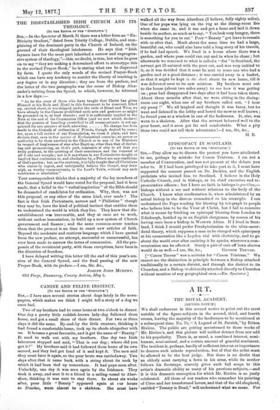THE DISESTABLISHED IRISH CHURCH AND ITS THEOLOGY.
[TO THE EDITOR OP THE "SPECITATOR.1 Sin,—In the Spectator of March 31 there was a letter from an " Ex- Divinity Student," dated from Trinity College, Dublin, and com- plaining of the dominant party in the Church of Ireland, on the ground of their theological intolerance. He says that " Irish laymen have for the most part inherited a narrow and unprogres- sive system of theology,"—this, no doubt, is true, but when he goes .on to say "they are making a determined effort to stereotype this in the revised Prayer-Book," he is stating what can be disproved by facts. I quote the only words of the revised Prayer-Book which can have any tendency to restrict the liberty of teaching in any degree or in any direction ; they are from the preface, and the latter of the two paragraphs was the cause of Bishop Alex- ander's retiring from the Synod, to which, however, he returned in a few days :— "As for the error of those who have taught that Christ has given Himself or his Body and Blood in this Sacrament to be reserved, lifted op, carried about, or worshipped, under the veils of Bread and Wine, we have already in the Canons prohibited such acts and gestures as might he grounded on it, or lead thereto ; and it is sufficiently implied in the Dote at the end of the Communion Office (and we now afresh declare) that the posture of kneeling prescribed to all communicants is not ap- pointed for any purporo of such adoration No change has been made in the formula of ordination of Priests, though desired by some ; for' upon a full review of our Formularies, we deem it plain, and hero declare that, save in the matter of Ecclesiastical censures, no power or authority is by them ascribed to the Church or to any of its Ministers in respect of forgiveness of sins after Baptism, other than that of declar- ing and pronouncing, on God's part, remission of sins to all that are truly penitent, to the quieting of their conscience. and the removal of all doubt and scruple ; nor is it anywhere in our Formularies taught or implied that confession to, and absolution by, a Priest are any conditions of God's pardon ; but, on the contrary, it is fully taught that all Christians who sincerely repeat, and unfeignedly believe the Gospel, may draw nigh, as worthy communicants, to the Lord's Table, without any such confession or absolution."
Your correspondent thinks that a majority of the lay members of the General Synod would have voted for the proposal, had it been made, that a belief in the " verbal inspiration " of the Bible should be demanded of candidates for ordination. Why, then, was not this proposal, or any other of the same kind, ever made ? The fact is that Irish Protestants, narrow and " Philistine " though 'they may be, have the kind of political instinct that enables them to understand the world in which they live. They knew that dis- establishment was irrevocable, and they at once set to work, -without useless lamentation, to build up a new system of Church government and finance ; and the same common-sense teaches 'them that the present is no time to enact new articles of faith. Beyond the moderate and cautious language which I have quoted from the new preface, no attempt, successful or unsuccessful, has ever been made to narrow the terms of communion. All the pro- posals of the revisionist party, with those exceptions, have been in the direction of freedom.
I have delayed writing this letter till the end of this year's ses- sion of the General Synod, and the final passing of the new Trayer-Book, with its preface.—I am, Sir, &c.,


































 Previous page
Previous page